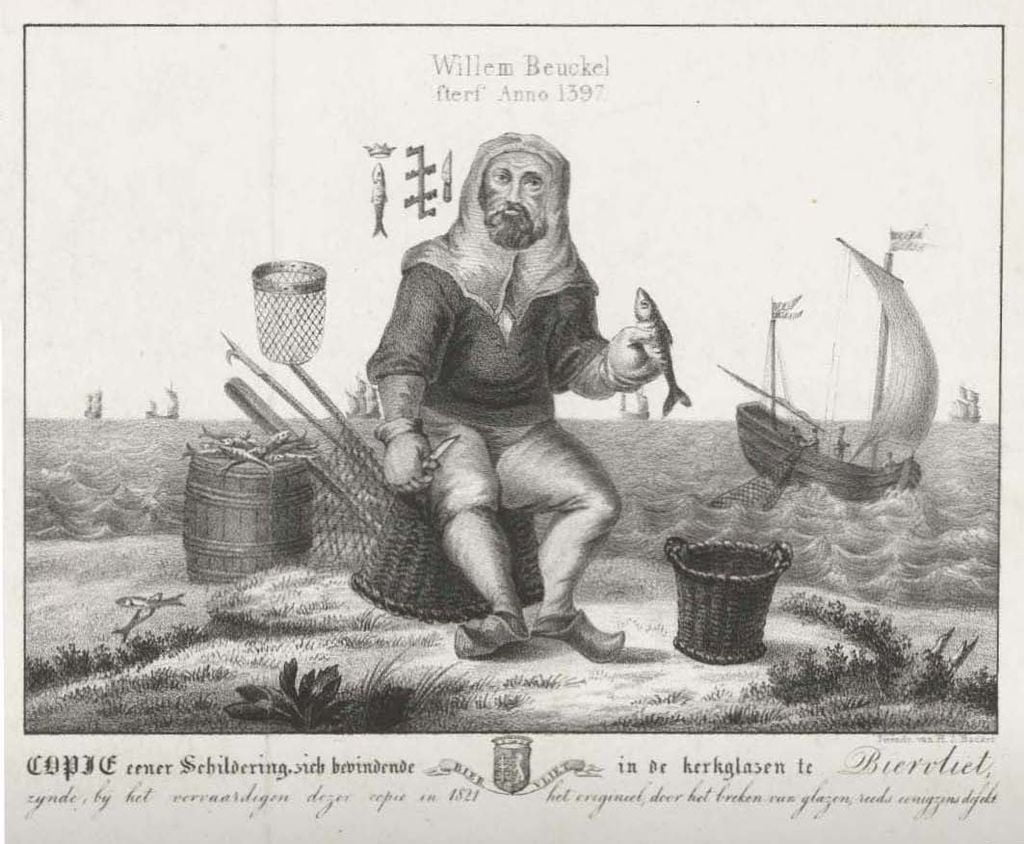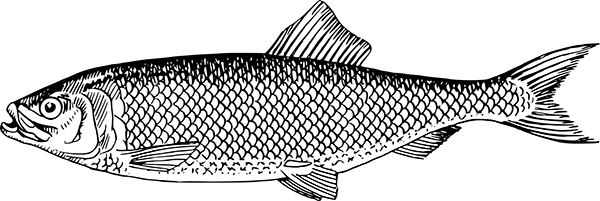On the semi-mythical C14th Dutch fisherman who may have come up with an improved method of gutting and salting herring
BEUCKEL, Willem

In 1556, at the town of Biervliet in the Dutch province of Zeeland, Charles V & I, retiring Holy Roman Emperor and King of Spain respectively, knelt at the tomb of Willem Beuckel and offered prayers for the benefit of his immortal soul. The tomb wasn’t there, Beuckel’s Biervliet having been destroyed by floods some years before and the entire town rebuilt on higher ground.
Preger
Were I a Dutchman I would depose the regal and rampant lion emblazoned on the arms of the Netherlands and enthrone in its stead a couple of crossed herrings, each with a golden ten-guilder piece in its mouth. I would place it on a field formed by a herring net. And I would be at least as proud of it as your Dutchman is of his “Nederlandsche Leeuw” (Netherlands Lion Rampant).
If I were to quarter the arms, I would have a herring smack on an azure field of undulating lines in the second quarter and a herring barrel or two in the third. The fourth quarter I would reserve for the representation of a statuette, carved in rock-salt, of a humble Dutchman, one by the name of William, son of Beukel.
Without William, son of Beukel, or to give him his Dutch apellative, Willem Beukelszoon, there would have been no such prosperity as ruled in Holland for centuries after he had made his momentous discovery.
Willem was a humble fisherman in the village of Biervliet in the Province of Zeeland. Like most of his kind, he lived the hard and simple life of a fisherman. And it must have hurt his thrifty soul to see so much of the herring catch which he and his mates brought in with great labour and in constant danger from the perils of the sea, go to waste. And all for the lack of means to preserve the surplus that could be neither consumed nor sold before it deteriorated.
He will have pondered and perhaps experimented until one day in the year 1380 or so – history is rather vague on the point – he made one of the great discoveries of the age. A discovery, be it said, which to this day is still the secret of the Dutch; a discovery which can be called the turning point in the destiny of the Dutch people. Momentous and far-reaching though it was, the discovery itself was simple enough. William, son of Beukel, discovered that herrings could be preserved in salt.
The Humble Dutch Herring, W Preger (1944)
From a historian’s perspective, Preger stands at the more credulous end of the herring commentator spectrum (see German Spies). Even so, although not quite as ambitious in his claims for Beuckel, A.M. Samuel (The Herring; its Effect on the History of Britain, 1918) credits him with the discovery of a method of curing, preserving and barrelling the herring which changed the course of European history; one which contributed more than anything else to the growth of the mercantile power and wealth of Holland.
The Stuyrman
Sadly, Willem / Wilhelm / William / George Beukels / Beukelz / Beuckels / Beuckelsz / Benkel / Beukelszoon / Beukelzon / Beukelsen / Beuckelsen / Benkelen finds no place in many of the more recent histories of Holland. An icon in the folklore of the Dutch Fisheries who may have died in 1347, 1397 or 1401, some pedants have argued that there is no proof of him ever having existed at all.
Clearly he wasn’t the first person to salt herrings. Salt had already played a major role in the Hanseatic League’s takeover of the Skåne fishery – and it had been used with other fish in early Egyptian times.
Beaujon, in The History of Dutch Sea Fisheries (1884) says Beuckelsz was a Stuyrman or skipper, who came from a wealthy family, but obviously created his own coat-of-arms, which is said to have consisted of two crossed “kaeckmeskens,” or knives used in curing herrings (kaken) after the manner invented by him and to which his name will be for ever attached.
He is referring to the Dutch innovation of opening, gutting, salting and packing the fish as soon as it had been hauled aboard the herring buss – the factory ship they developed for their Grand Fishery.
Books
The History of Dutch Sea Fisheries by A Beaujon, London, 1884
The Herring; its Effect on the History of Britain by Arthur Michael Samuel, London, 1918
The Humble Dutch Herring by W Preger, Melbourne, 1944
